Key takeaways:
- News anxiety stems from constant exposure to negative headlines, impacting mental well-being and creating feelings of helplessness.
- Effective strategies for managing news anxiety include setting boundaries on news consumption, practicing mindfulness, and curating information sources to include positive content.
- Creating a structured schedule for news consumption fosters a healthier relationship with news and reduces overwhelm.
- Engaging actively with news through reflection and journaling transforms the experience from passive consumption to constructive processing.
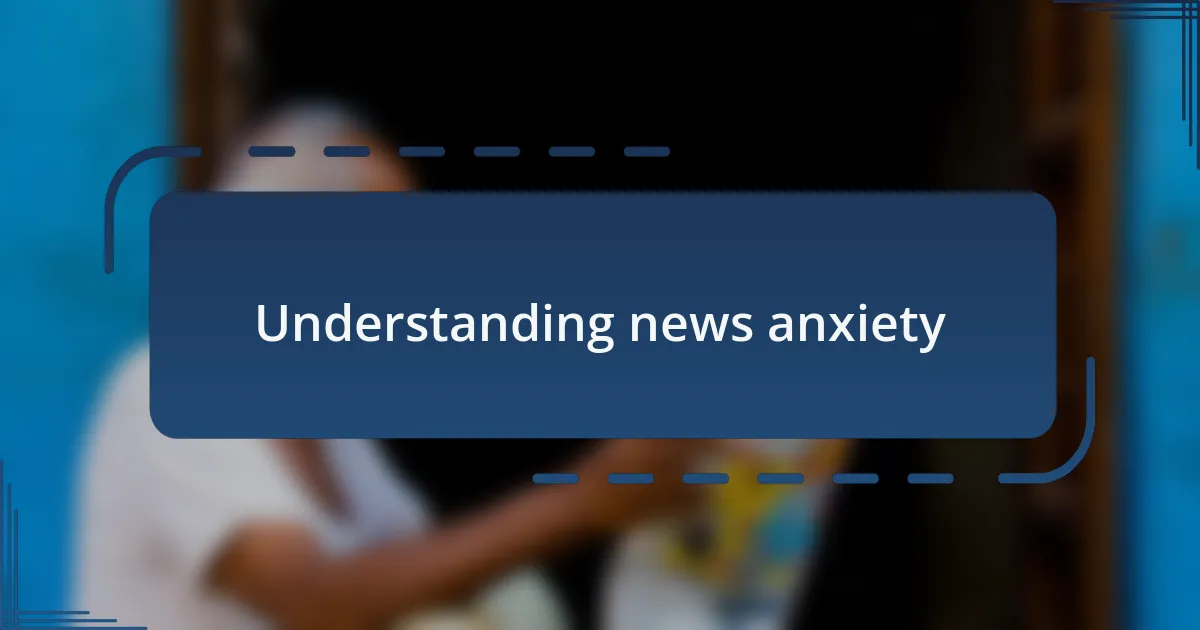
Understanding news anxiety
News anxiety is a pervasive feeling that many of us experience, often triggered by the deluge of negative news stories we encounter. I remember a time when I found myself constantly checking the news, feeling my heart race with each alert. It was as though I was on a never-ending emotional rollercoaster—why do we feel compelled to know every detail when it often just leaves us feeling more anxious?
The issue isn’t just about the headlines; it’s also about how they impact our mental state. I’ve noticed that after a particularly intense news cycle, I felt a weight on my chest, as if the world’s troubles were my own. Does anyone else feel this burden? Acknowledging news anxiety is the first step toward understanding it and realizing that we are not alone in our struggles.
Talking about it with friends has been a game changer for me. When I share my feelings, it helps lighten the load and opens up a dialogue about our collective experiences. Have you ever considered how discussing your emotional responses to the news could change the way you consume information? Engaging in these conversations can foster a sense of community and support, making news anxiety a little easier to handle.
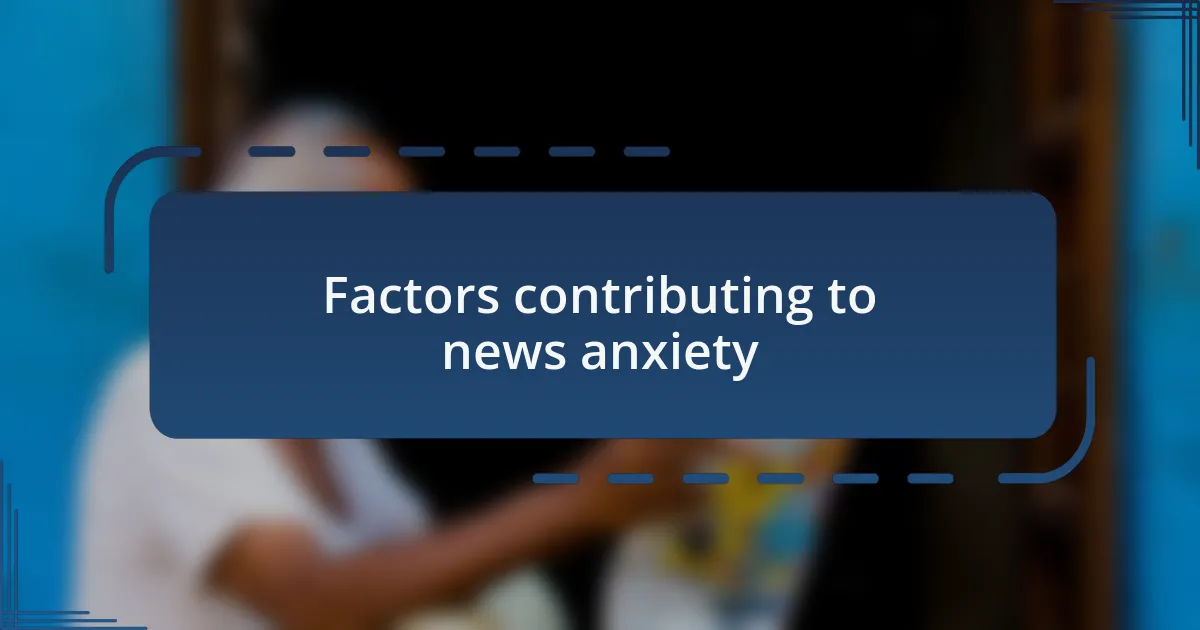
Factors contributing to news anxiety
It’s interesting how the sheer volume of news we consume each day can amplify our anxiety. I still remember a weekend when I decided to catch up on the news for just an hour—three hours later, I was overwhelmed by the constant barrage of bad headlines. I often wonder how that much information can fit into our minds without leaving us feeling drained.
The way news is presented also plays a crucial role in shaping our emotional responses. I sometimes feel that sensationalist headlines are designed not just to inform, but to provoke fear. It makes me question whether the media’s emphasis on negativity is a reflection of our collective consciousness or if it’s simply a tactic to grab more attention. Have you felt that creeping dread when reading about yet another crisis?
Finally, I think the accessibility of news through our devices can be a double-edged sword. The perpetual connectivity means we are rarely free from its grasp. Just last week, while scrolling through my phone, I realized I had stumbled into a news spiral that left me feeling anxious and unsettled. Is this constant access to information beneficial, or is it creating a cycle of anxiety we can’t seem to escape? It’s something worth contemplating as we navigate our relationship with the news.
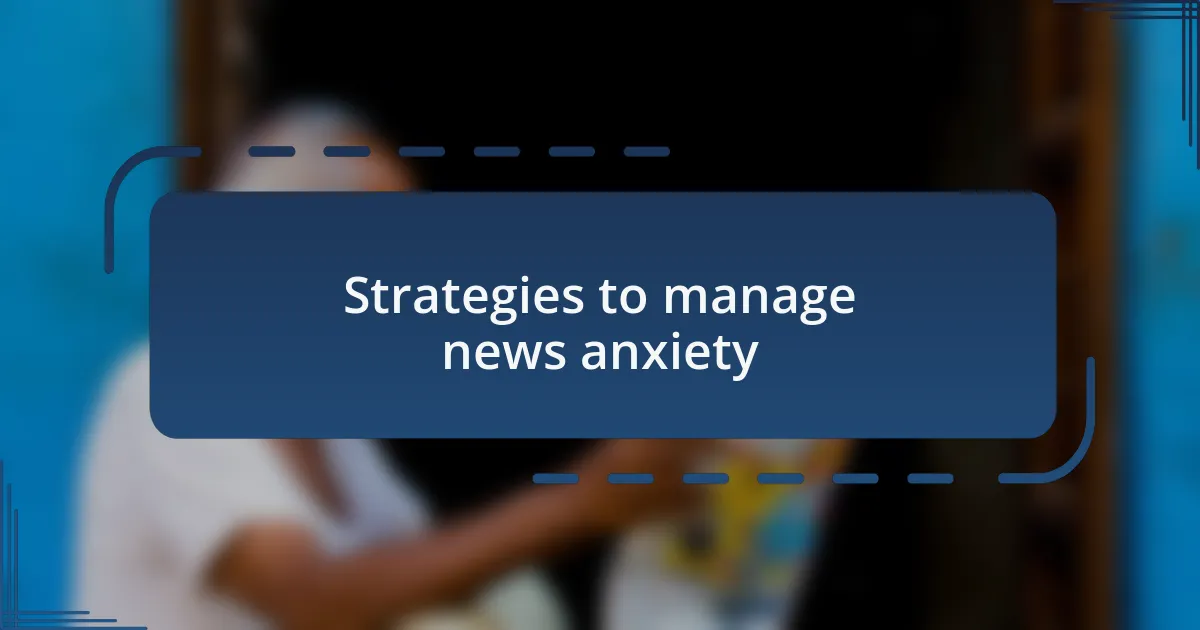
Strategies to manage news anxiety
One effective strategy I use to manage news anxiety is setting clear boundaries on my news consumption. For instance, I restrict myself to checking the news only twice a day. By doing this, I’ve noticed a significant reduction in my anxiety levels. Have you tried limiting your intake? It helps to create space for other activities that bring joy and relaxation.
I also find that engaging in mindful practices, like deep breathing or meditation, can be incredibly beneficial when I’m feeling overwhelmed. There have been moments when I’ve sat in a quiet room for just five minutes, focusing on my breath. It’s surprising how quickly I can regain a sense of calm. Have you experienced the power of moments like these to reset your mind?
Another strategy I often recommend is to curate the sources I rely on for news. I’ve learned that diversifying my information intake by including more positive or solution-oriented content can provide a better balance. For example, I now follow newsletters that focus on good news or inspiring stories amidst the chaos. How do you think changing your sources might impact your perception of the news? I believe it could be transformative, turning anxiety into hope.
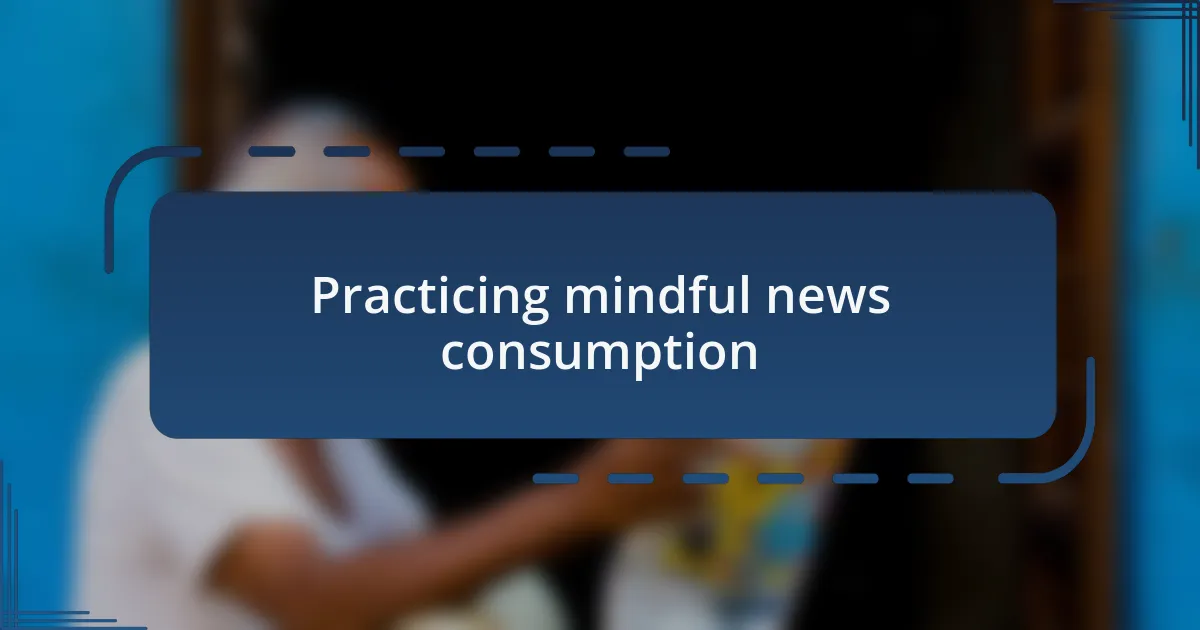
Practicing mindful news consumption
Practicing mindful news consumption has been a game-changer for me. I find that when I intentionally choose specific times to engage with news, rather than scrolling aimlessly throughout the day, it creates a more controlled environment. Have you ever noticed how just setting a time can shift your focus from stress to awareness? It’s a simple yet effective way to manage what feels overwhelming.
I’ve also started incorporating breaks into my news routine. After I read a headline or an article, I give myself permission to step away for a bit, whether it’s stretching my legs or enjoying a cup of tea. These pauses help me digest the information without becoming bogged down by it. I often ask myself, “How does this piece of news affect me personally?” This reflection keeps my anxiety at bay because I prioritize what truly matters.
Another technique I practice is to engage with the news actively rather than passively. When I read an article, I often jot down my thoughts or reactions in a journal. This practice helps me process my emotions and keeps me grounded. I wonder, have you ever tried expressing how you feel about what you read? It can turn the consumption of news into a more constructive experience, allowing me to transform worry into understanding.
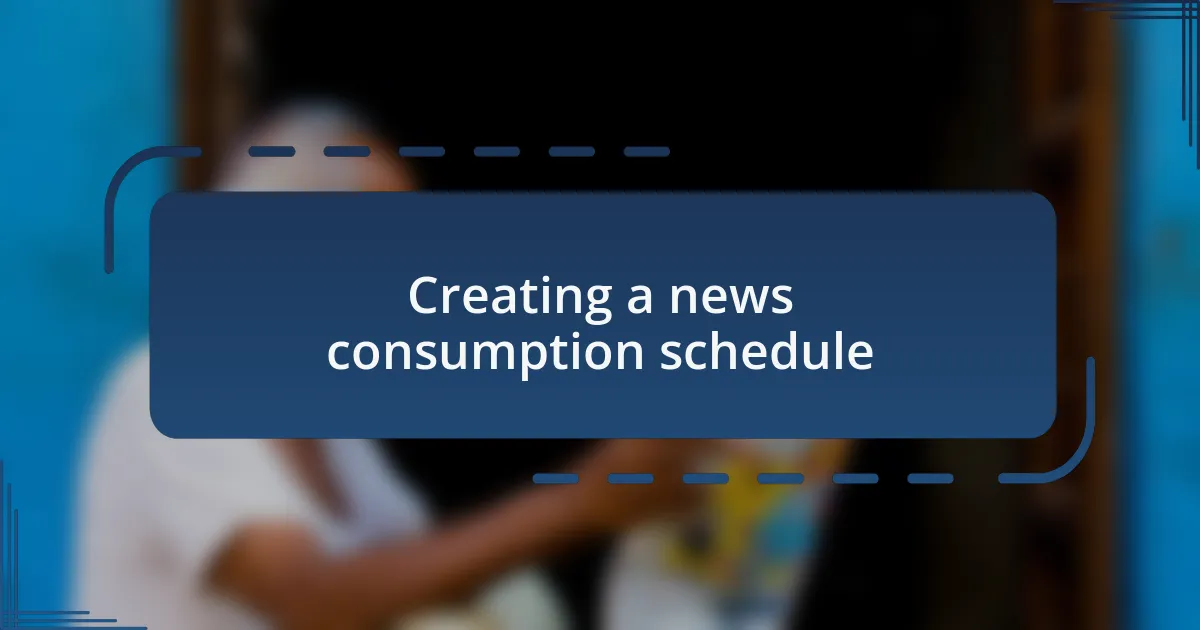
Creating a news consumption schedule
Creating a news consumption schedule has significantly helped regulate my feelings around the news. I set aside specific times each day, much like scheduling a meeting, which allows me to prepare mentally for what I’m going to engage with. Have you ever realized how creating a routine can provide a sense of stability in the midst of chaos? It’s almost like giving yourself permission to care without becoming overwhelmed.
I find that limiting my consumption to just one or two focused sessions a day fosters a healthier relationship with news. For instance, I allocate a 30-minute window in the morning and another in the evening. This structure not only limits my exposure to distressing information but also ensures I’m informed without drowning in negativity. How refreshing is it to end the day without the weight of constant snippets of news hovering over you?
Additionally, I use a digital calendar to mark these news slots, which serves as a gentle reminder and keeps distractions at bay. It’s fascinating how a simple tool like this can help me reclaim my time and sanity. I often think about how much clarity I’ve gained since starting this routine. Have you ever tried scheduling your news days? You might discover that being intentional with your consumption elevates your overall well-being.
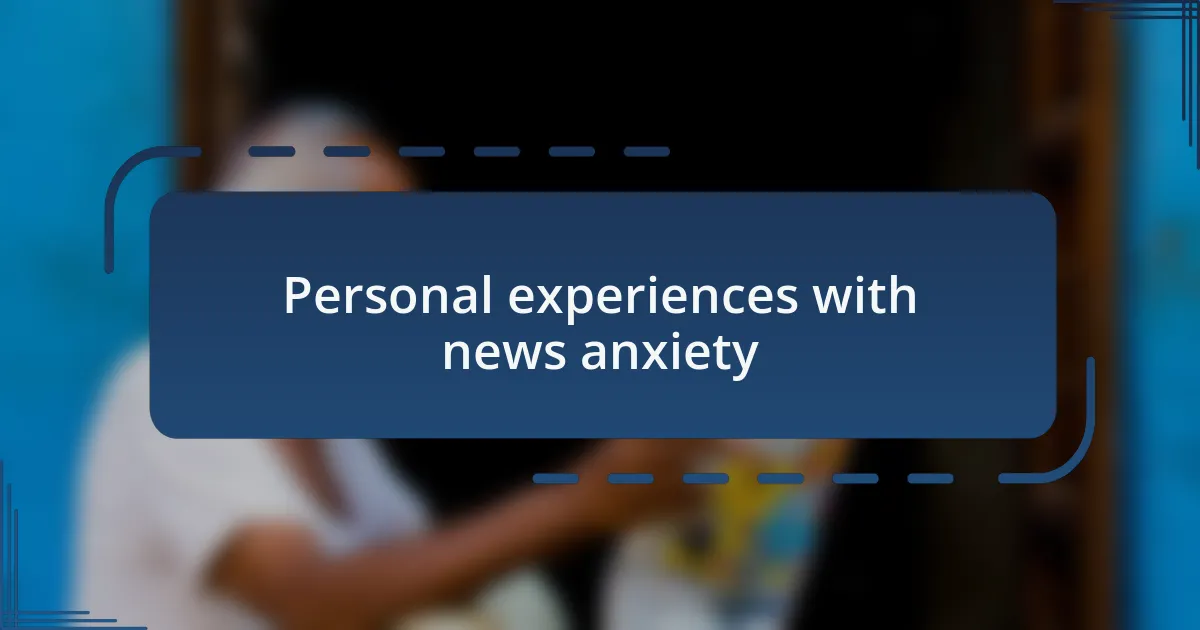
Personal experiences with news anxiety
I vividly remember a day when the headlines felt particularly overwhelming. I found myself constantly refreshing my news app, each alert sending a ripple of anxiety through me. It made me wonder, have you ever felt that sense of helplessness while consuming the news? I realized I couldn’t continue this cycle without losing my grip on my mental health.
During a particularly tense week filled with major events, I noticed that my mood shifted dramatically. I was irritable and anxious, and it hit me how much constant exposure to breaking news was affecting my emotional state. It was a wake-up call to recognize that taking a step back wasn’t just okay, it was necessary. I started reflecting on how often we sacrifice our peace for the sake of staying informed.
I also recall the day I decided to embrace the “news detox” approach for a weekend. By tuning out entirely, I found freedom from the relentless barrage of information. Believe me, that brief escape was restorative. Have you ever wondered if disconnecting might actually lead to more clarity rather than less? I came to see that sometimes, stepping away gives us a clearer perspective on the world around us.